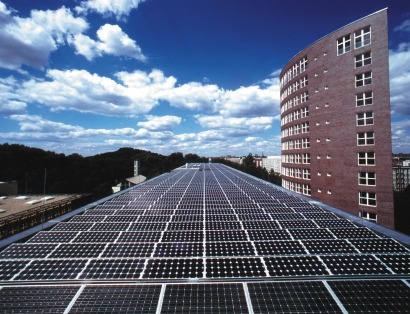
Bloomberg New Energy Finance (BNEF) has published a new report pointing out that even when policies supportive of renewable energy have been put in place the results are invariably mixed with limited uptake unless risk-adjusted returns are extremely generous. BNEF’s white paper concludes that the regulation of financial investment itself may be what is holding back investment, rather than particular political policies.
The reports says that in order to ensure that energy-related carbon emissions peak by 2020 and then decline investment in renewables will have to more than double. Regulation of banks, insurance companies and pension funds can adversely affect sustainable investment in three distinct ways. It can dissuade investors from investing in infrastructure in general, forcing the economy to remain dependent on heavily dependent legacy assets. Secondly, because most renewable energy projects require heavy up-front investment, any bias against capital investment is therefore a de facto bias against clean energy. Third, where investment does occur, rules governing investment may favour conventional rather than clean energy.
Upcoming Basel III rules significantly affect the ability of banks to provide long-term non-recourse project finance. This in turn affects the availability of capital for all infrastructure projects, but particularly wind and solar on account of high upfront capital costs. These regulations are also driving up the cost of short-term construction finance. Furthermore concerns about longer-term follow-on finance are forcing banks to be overly-restrictive with regard to the number of projects they support.
Solvency II regulations will reduce the appetite of insurance companies for long-term investment and rules on the matching of assets and liabilities tend to push pension fund trustees into adopting a highly conservative approach to asset allocation. In the UK, if not elsewhere, rules for calculating Pension Protection Fund fees can penalise investment in infrastructure.
The report expresses similar concerns with regard to laws governing the fiduciary duties of pension fund trustees, legal ownership structures in the US and Canada, laws governing the disclosure of risks by publicly quoted companies, the use of ratings agencies as a means of protecting investors from risks, public sector accounting rules and rules on state aid.
Michael Liberich described the financial system as ‘institutionally fossilist’ and said that it was "pervasively biased against clean energy and clean infrastructure investment in favour of incumbent technologies". For example, the laws governing fiduciary duties do not require trustees to take into account systemic risks such as climate change or performance on environmental, social or governance dimensions leading to investors invariably avoiding such analysis.
The white paper goes on to examine each of these areas in detail drawing on contributions from distinguished reviewers working with organisations such as the US National Renewable Energy Laboratory (NREL), the Climate Disclosure Standards Board, OECD, Climate Change Capital and various others around the world.
Further information:

